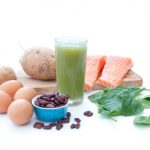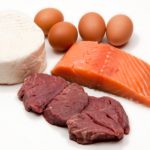 Proteins, carbohydrates and fats all play a role in type 2 diabetes, and some research suggests higher protein diets are more beneficial for those with type 2 diabetes. Before we explore the role of high protein diets for diabetics, let’s look into the role of protein, carbohydrates and fat.
Proteins, carbohydrates and fats all play a role in type 2 diabetes, and some research suggests higher protein diets are more beneficial for those with type 2 diabetes. Before we explore the role of high protein diets for diabetics, let’s look into the role of protein, carbohydrates and fat.
A healthy diet is essential for all of us – but diabetics especially. The goal is to achieve balance between fats, protein and carbohydrates in order to properly manage type 2 diabetes.
Advertisement
As much as many of us fear fat, fat is still essential for good health, as long as we stick to the healthy fats (monounsaturated and unsaturated fat). Twenty to 30 percent of our total calories should come from healthy fats. If you’re diabetic, you will especially want to avoid saturated and trans fats.
Protein is essential for good health and 15 percent of our daily calories should come from it. For diabetics the recommendation for daily protein is 10 percent of total calories. Protein can be obtained from both plant and animal sources, but for diabetics it is best to get the majority of protein from plants, such as beans and nuts.
Diabetics may steer clear of carbohydrates as they can raise blood sugar, but our bodies require carbohydrates for energy so choosing the right ones can improve health. Diabetics should choose complex carbohydrates and not sugary or refined ones. Sticking with whole grains, as opposed to white flour, will provide longer lasting power and avoid crashes in blood sugar.
The goal is to enjoy a balance of all three categories to properly manage diabetes, but research suggests higher-protein diets may benefit diabetics more so.
High protein diet may help some with type 2 diabetes
 The research suggests that high protein diets may benefit some with type 2 diabetes – but this is dependant on a gene related to the metabolism of vitamin D. The research focused on overweight type 2 diabetics and found they lost similar amounts of weight over two years while either eating a high-protein, low-protein, low-fat or high-fat diet.
The research suggests that high protein diets may benefit some with type 2 diabetes – but this is dependant on a gene related to the metabolism of vitamin D. The research focused on overweight type 2 diabetics and found they lost similar amounts of weight over two years while either eating a high-protein, low-protein, low-fat or high-fat diet.
The difference that emerged was related to insulin levels. In those who consumed high protein diets insulin sensitivity improved, resulting in less sugar spikes. But it wasn’t simply the diet that achieved these results; the patients who achieved these results had a particular gene variant which boosted vitamin D.
Currently, the researchers are unaware what their findings mean, and unfortunately, not much can be done about this because we won’t know who has this gene variant. Previous research revealed that low vitamin D increases the risk of chronic illness.
For this study, 645 overweight and obese adults were given either a high protein, low protein, high fat or low-fat diet. All members experienced similar weight loss and vitamin D did not have any affects on this. Vitamin D was shown to play a role in insulin sensitivity due to a gene variant.
Limitations of the study include that vitamin D in the blood was not recorded and they did not evaluate the benefits of high protein diets on long-term health.
Vitamin D deficiency and diabetes
Research conducted in early 2015 revealed that individuals with low vitamin D have an increased risk of type 2 diabetes. For the study, 150 people from Spain had their vitamin D levels checked along with their body mass index (BMI). They also received tests for diabetes, prediabetes and other blood sugar metabolism disorders.
Those who were obese without diabetes or other metabolic disorders were found to have higher vitamin D levels. Lean people with diabetes or other metabolic disorders were found to have lower levels of vitamin D. This revealed that vitamin D was more closely linked with blood sugar levels as opposed to BMI.
One aspect remained unclear: whether or not the levels of vitamin D were the actual cause of diabetes. The findings suggest that individuals may benefit from heading outside and boosting their vitamin D levels. Study author, Manuel Macias-Gonzalez, said, “The average person may be able to reduce their risk by maintaining a healthy diet and getting enough outdoor activity.”
The findings were published in the Journal of Clinical Endocrinology & Metabolism.
Protein and diabetes
Protein is one of the three main ways our body produces energy; the other two are carbohydrates and fat. Protein is requires by all of our body’s cells and makes up a sixth of our total body weight. Protein can become energy by breaking down into glucose, which is then used up for energy.
You may not notice when protein is being used for energy, but if you consume a meal with little carbohydrates, you’ll feel the difference. Protein is broken down into glucose less effectively than carbohydrates, so you won’t notice changes until several hours after eating. Carbohydrates, however, begin to work more immediately.
The recommended serving of protein for diabetics over the age of 50 is 53 grams.
Best high protein food choices
 If you want to get the most protein in the smallest proportions, then you want to stick with these high protein food options. Protein can come in different forms: plant-based, fish and seafood, chicken and other poultry and cheese and eggs.
If you want to get the most protein in the smallest proportions, then you want to stick with these high protein food options. Protein can come in different forms: plant-based, fish and seafood, chicken and other poultry and cheese and eggs.
Plant-based proteins are also good for you because they provide other nutrients and vitamins, such as fiber, vitamin B and iron, just to name a few.
The best protein foods you can enjoy from each protein category consist of:
- Beans, such as black, kidney, pinto
- Bean products like baked beans and refried beans
- Hummus and falafel
- Lentils, such as brown, green or yellow
- Peas, such as black-eyed or split peas
- Edamame
- Soy nuts
- Nuts and spreads, such as almond butter, cashew butter, peanut butter
- Tempeh, tofu
- Fish high in omega-3 fatty acids, such as Albacore tuna, herring, mackerel, rainbow trout, sardines, salmon
- Other fish, such as catfish, cod, flounder, haddock, halibut, orange roughy, tilapia
- Shellfish, such as clams, crab, imitation shellfish, lobster, scallops, shrimp, oysters
- Chicken, turkey, Cornish hen
- Reduced-fat cheese
- Cottage cheese
- Egg whites and egg substitutes
- Buffalo, ostrich, rabbit, venison
- Dove, duck, goose, pheasant (no skin)
- Beef
- Lamb
- Organ meats – liver, kidney
- Veal
- Pork
Popular protein diets
 If you’re looking to increase your protein intake there are many diets available which focus primarily on protein. But be cautious: a high protein diet is not for everyone. For example, if you have kidney problems, always speak to your doctor about beginning a high protein diet. Here are some common high protein diets to consider.
If you’re looking to increase your protein intake there are many diets available which focus primarily on protein. But be cautious: a high protein diet is not for everyone. For example, if you have kidney problems, always speak to your doctor about beginning a high protein diet. Here are some common high protein diets to consider.
Biggest Loser diet: Made popular by the TV show, the Biggest Loser diet promises weight loss in six weeks with their plan of high fruits and vegetables, minimizing red meat consumption, and documenting all eating in a food journal. The diet promises cardiovascular benefits can also be used to manage diabetes.
Paleo: This style of eating is similar to cavemen, or the hunter-gatherer style of eating. This diet advocates only foods that our ancestors once ate – essentially if you can hunt of gather it, you’re allowed to eat it. No processed foods are allowed and no carbohydrates from grains.
Vegetarian diet: This style of eating removes the consumption of animals and only uses plant-based sources for protein. Depending on the type of vegetarian you are, you may be able to consume eggs and cheese.
DASH diet: Dietary Approached to Stop Hypertension (DASH) is intended to boost cardiovascular health and stop hypertension. It is rich in foods with potassium, calcium and protein, which work to combat high blood pressure.
Vegan diet: This diet does not allow for the consumption of animals or animal by-products. This is strictly a plant-based diet, so protein must come from grains and plants.
The Engine 2 diet: This is a low-fat, strong plant-based diet. This diet encourages you to eat whole foods gradually while eliminating meat products.
The Flexitarian diet: This is a flexible version of the vegetarian. Although plant-based foods are still a large part of this diet, you are allowed to consume dairy products and eggs as well.
Many of these diets provide benefits to your heart as well as brain, but as mentioned, before you change how you eat speak with a doctor for clearance. The main theme across all these diets is to consume more fruits and vegetables, as the typical American diet seems to be lacking. As long as you consume foods in moderation, and limit or avoid processed foods, you will feel better and your body will stay healthier for years to come. Eating doesn’t need to be complicated, but you may find these diets jumpstart you towards success.
Related Reading:
High protein diets improve blood sugar control in diabetics, do not affect kidneys
A recent study, published in the journal Diabetologia, found high protein diets improve blood sugar control in diabetics without negatively affecting the kidneys. Previous research has shown positive and negative effects of a high protein diet for diabetics. Continue reading…
Advertisement
High protein diet boosts cardiovascular health
According to the WHO (World Health Organization) and the CDC, heart disease is the leading cause of death in developed countries like the UK, the U.S., Canada and Australia. n the U.S. alone, almost 11.5 percent of the total adult population is diagnosed with heart disease and/or heart problems. Continue reading…
Sources:
http://health.usnews.com/health-news/articles/2015/09/29/higher-protein-diet-may-help-some-with-type-2-diabetes
http://www.livestrong.com/article/363268-the-ratio-of-fats-carbohydrates-protein-for-diabetics
http://www.webmd.com/diabetes/news/20150223/low-levels-of-vitamin-d-linked-to-type-2-diabetes-risk
http://www.diabetes.co.uk/nutrition/protein-and-diabetes
http://www.diabetes.org/food-and-fitness/food/what-can-i-eat/making-healthy-food-choices/meat-and-plant-based-protein
http://health.usnews.com/best-diet/best-diabetes-diets
